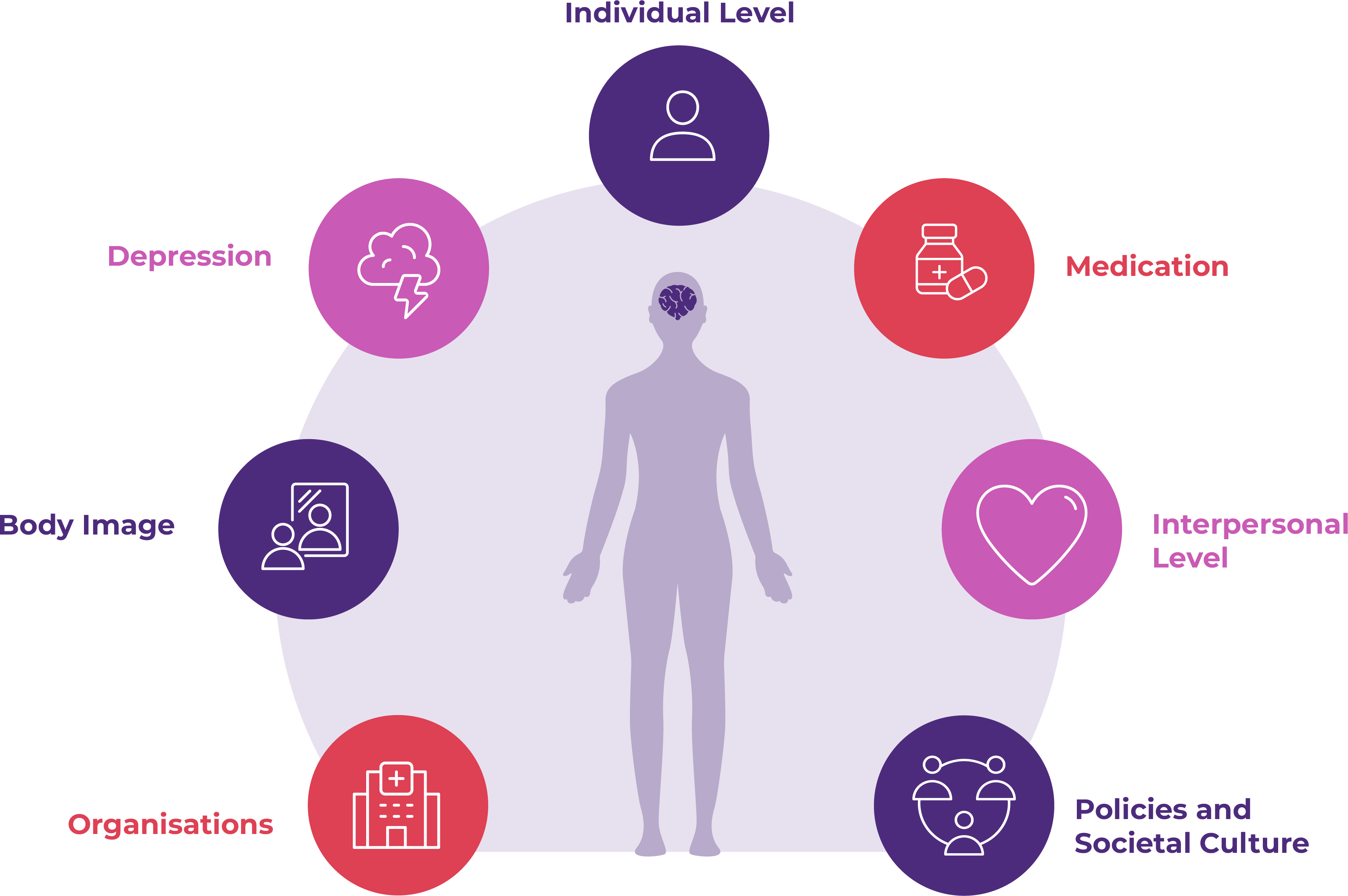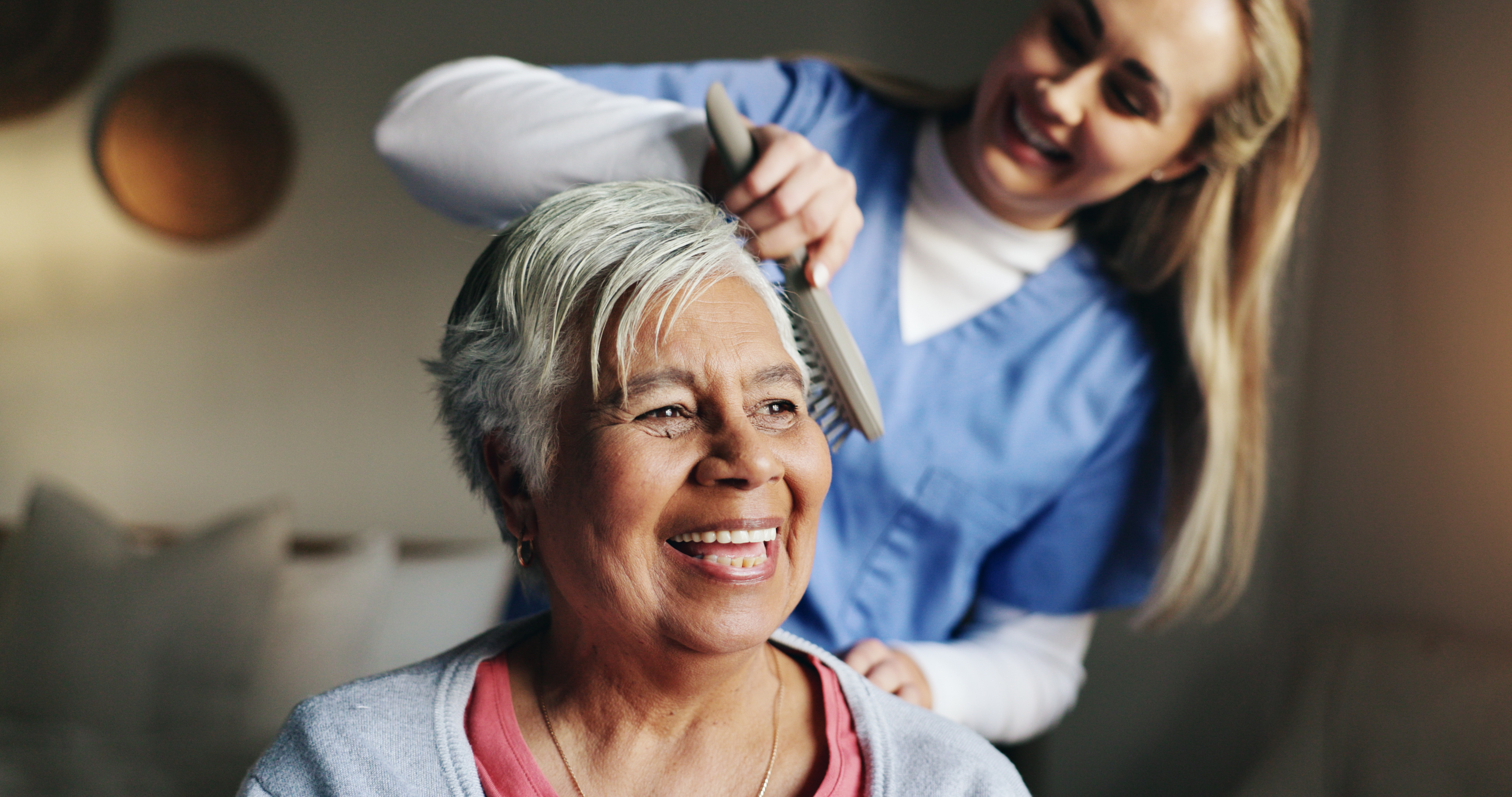Unit 1: Understanding sexuality, intimacy and relationships in dementia
The World Health Organisation definition of sexuality describes the centrality of sexuality to our humanity:
…a central aspect of being human throughout life encompasses sex, gender identities and roles, sexual orientation, eroticism, pleasure, intimacy and reproduction. Sexuality is experienced and expressed in thoughts, fantasies, desires, beliefs, attitudes, values, behaviours, practices, roles and relationships. While sexuality can include all of these dimensions, not all of them are always experienced or expressed. (World Health Organisation 2002, p5) (9)World, Health, Organisation. Defining sexual health: Report of a technical consultation on sexual health, 28-31 January 2002, . Geneva2006.
Learning objectives
- Describe the different conditions associated with dementia
- Explain how sexuality and intimacy are important aspects of the whole person
- Adopt a rights-based approach to supporting people living with dementia in their intimate and sexual relationships
What is Dementia?
Dementia refers to a group of symptoms associated with a decline in cognitive function that affects memory cognitive abilities and behaviour. While age is a major risk factor for dementia, it is not a normal part of aging. World Health Organization. Global action plan on the public health response to dementia 2017–2025 [Internet]. 2017 Dec [cited 2023 Oct 30].
PREVALENCE OF DEMENTIA
Almost 1 million people are living with dementia in the UK this is expected to rise to 1.4 million in 2040 (source)
Although Dementia is seen as a disease that affects older people there are a significant number of people under the age of 65 living with dementia. There are many different types of Dementia, and we will explore the most common types.


Types of Dementia
Alzheimer's Dementia
The most common type of dementia explains 60-70% of cases characterised by the build-up of abnormal proteins in deposits in the brain. It causes impairment in a person’s ability to think, remember, speak and make decisions. Even under the term Alzheimer’s there are many different types of disease.
Vascular Dementia
The second most common dementia, representing approximately 20% of those with a dementia diagnosis. This dementia occurs when there is damage to blood vessels in the brain. The symptoms vary in severity from person to person and may include problems of reasoning, planning, judgement and memory. (10)Duffy M. CLEAR dementia care©: A model to assess and address unmet needs: Jessica Kingsley Publishers; 2019.
Dementia with Lewy Bodies
The third most common type (accounting for 4% of people diagnosed with dementia). This type of dementia is caused by a buildup of protein deposits called Lewy Bodies. This leads to a progressive decline in cognitive function. There are fluctuations in ability, the person may stare or be unable to converse, yet other times they can participate well. They have no control over the fluctuating ability. They may also have problems with concentration, memory, decision making, planning and organising. There may also be some difficulty relating to space and perceptions of object with possible visual or auditory hallucinations.
Frontal Temporal Dementia
Frontal Temporal Dementia (FTD) is a rarer type of dementia and is more common in younger people in their 50s and 60s. It is caused by a buildup of proteins in the frontal and temporal lobes that damage the brain. Some chemical messengers are lost resulting in changes in personality, behaviour and language skills. The symptoms can include:
- Losing normal inhibitions
- Behaving in a sexual manner in public places
- Becoming more extrovert, perhaps more tactless in what they say or do
- Listless, with decreased interest and motivation
- Interestingly, memory is preserved in early part of FTD (10)Duffy M. CLEAR dementia care©: A model to assess and address unmet needs: Jessica Kingsley Publishers; 2019.
Mixed Dementia
Characterised by the hallmark features of more than one dementia, most commonly Alzheimer's with Vascular Dementia. One of the experiences of dementia as it progresses is the loss of ability to complete activities of daily living, and the things that are important to the person independently.
One of the experiences of dementia is loss - 'a person with Dementia has no choice about the many losses they experience' (10, p38)Duffy M. CLEAR dementia care©: A model to assess and address unmet needs: Jessica Kingsley Publishers; 2019., however, as people who work in health and social care, we need to ensure that potential not loss is maximised and that personhood is retained (11)Carter M. The Person as Environmentally Integrated. Journal of Ethics and Social Philosophy. 2024;28(1).. The experience of people with dementia will be greatly influenced by the health care professionals they encounter on their journey (12)Mitchell G, McTurk V, Carter G, Brown-Wilson C. Emphasise capability, not disability: exploring public perceptions, facilitators and barriers to living well with dementia in Northern Ireland. BMC Geriatrics. 2020;20(1)..
In this first video Dr. Frances Duffy Consultant Clinical Psychologist discusses how dementia impacts sexuality intimacy and relationships. How needs for intimacy change throughout life not only when living with dementia.
Dementia, Sexuality, Intimacy and Relationships
What is sexuality?
Sexuality, intimacy, and relationships are crucial aspects of our lives throughout our lives. They can influence how we see ourselves and the roles we hold. This continues to be important across our lifespan (13)Sladden T, Philpott A, Braeken D, Castellanos-Usigli A, Yadav V, Christie E, et al. Sexual health and wellbeing through the life course: Ensuring sexual health, rights and pleasure for all. International Journal of Sexual Health. 2021;33(4):565-71.. Our sexuality and the expression of that sexuality is an integral part of our daily living experience.
Sexual expression may include the maintenance of physical appearance; passing compliments; having close proximity and physical contact (e.g. holding hands, hugging/cuddling and kissing); display of affection; flirting; reading or watching sexually explicit materials; masturbation; as well as sexual intercourse (14)Nay R, Garratt S. Nursing older people: issues and innovations. 2nd ed. ed: Churchill Livingstone; 2004.. We all need to feel loved and this is no less true for people with a dementia, indeed it has been found that a feeling of togetherness and closeness can increase life satisfaction (15)Roelofs TSM, Luijkx KG, Embregts PJCM. Intimacy and sexuality of nursing home residents with dementia: A systematic review. International Psychogeriatrics. 2015;27(3):367-84..
There is a misperception that sexual need declines in later life and is less important. However, research indicates that sexual activity is a very important aspect of people's lives (16)Gott M, Hinchliff S. How important is sex in later life? The views of older people. Social science & medicine. 2003;56(8):1617-28.. The feeling of being loved and being able to express sexuality in a safe and rewarding way contributes to an individual’s overall sense of self-worth and wellbeing. 'The sexual rights of people with a dementia are as much about enabling people living with dementia to express their sexuality and maintain their sexual relationships as protecting from sexual risk' (17)Grigorovich A, Kontos P, Heesters A, Martin LS, Gray J, Tamblyn Watts L. Dementia and sexuality in long-term care: Incompatible bedfellows? Dementia. 2022;21(4):1077-97.. Careful attention to capacity and consent of both parties is integral to ensuring both safety and dignity.
What is intimacy?
Intimacy is a key feature of sexuality and refers to connection with others based on feelings of care and affection. Intimacy is often used interchangeably with sexuality. However, it can be seen as a broader aspect of the human experience which includes emotional closeness, trust, as well as physical intimacy. This does not have to include sex, although sex and its associated acts do cultivate physical intimacy e.g. holding hands, hugging and kissing.
At all stages of adulthood, engaging in intimate relationships is associated with positive self-esteem, self-regard, sexual identity and aging well (18)Simpson P, Horne M, Brown LJE, Wilson CB, Dickinson T, Torkington K. Old(er) care home residents and sexual/intimate citizenship. Ageing and Society. 2017;37(2):243-65. (19)Syme ML, Johnson PE, Fager M. Person-centered sexual expression: determining preferences of future nursing home residents. The Gerontologist. 2020;60(4):725-34.. Changes that are a normal part of aging, as well as a dementia can impact sexual functioning. Dementia can change the intimacy between couples and can bring about conflicts and difficulties in shared relationships, but evidence suggests that shared affection and long-term partnership help maintain the spousal relationship (20)Eskola P, Jolanki O, Aaltonen M, editors. Through thick and thin: The meaning of dementia for the intimacy of ageing couples. Healthcare; 2022: MDPI.. As health care workers, we can support people with dementia to maintain these bonds that can provide comfort and familiarity in a very unfamiliar world.
Is sexuality and intimacy important to people living with Dementia?
Discussions on sexual relationships in care settings are often avoided due to societal perceptions and discomfort (21)Horne M, Youell J, Brown LJ, Simpson P, Dickinson T, Brown-Wilson C. A scoping review of education and training resources supporting care home staff in facilitating residents’ sexuality, intimacy and relational needs. Age and ageing. 2021;50(3):758-71.. However many people with dementia value continuing their intimate relationships (22)Roelofs TSM, Luijkx KG, Embregts PJCM. Love, Intimacy and Sexuality in Residential Dementia Care: A Client Perspective. Clinical Gerontologist. 2021;44(3):288-98.. Indeed international evidence suggests that maintaining a healthy sex life can be valuable for maintaining and improving health, well being (23)Smith AG, Bardach SH, Barber JM, Williams A, Rhodus EK, Parsons KK, et al. Associations of Future Cognitive Decline with Sexual Satisfaction among Married Older Adults. Clinical Gerontologist. 2021;44(3):345-53. and cognitive function (24)Wright H, Jenks RA. Sex on the brain! Associations between sexual activity and cognitive function in older age. Age and Ageing. 2016;45(2):313-7..
An intimate relationship can bring happiness, joy, and meaning to the life of an older adult who faces each day with confusion. Other emotions that sexual expression and intimacy can evoke include shared trust, warmth, humor, comfort and safety. (25)Doll GA. Sexuality and long-term care: Understanding and supporting the needs of older adults: Health Professions Press; 2012.
People generally express their sexuality in private and with consenting partners in whichever way they choose (7)Wilson CB. Caring for people with dementia: a shared approach. london: sage; 2017.. However as Dementia progresses and people lose their independence, others become involved in their lives and their choices start to be the business of other people (3)Lipinska D, Heath H. Sexually speaking: person-centred conversations with people living with a dementia. Nursing older people. 2023;35(6).. Staff can face moral dilemmas in supporting these relationships, particularly in residential care settings (18)Simpson P, Horne M, Brown LJE, Wilson CB, Dickinson T, Torkington K. Old(er) care home residents and sexual/intimate citizenship. Ageing and Society. 2017;37(2):243-65.. This resource may help to support best practice, offering guidance to help staff work with the person rather than the dementia at the centre of care.
In this video Debbie, Dementia Services Improvement Lead for acute setting at the Belfast trust discusses the importance of considering the environment of acute care that can be stressful for the person living with dementia, and how as health and social care staff we can manage the environment to ensure people who are admitted to acute care feel safe and their needs understood.
Sexual Well-Being
Sexual health involves physical, emotional, mental, and social health related to sexuality. This definition from the World Health Organisation also emphasises the positive and respectful approach to sexuality, where there is a possibility of pleasure that is free from coercion.
The ability to achieve sexual health and well-being depends on:
- access to comprehensive, good-quality information about sex and sexuality;
- knowledge about the risks and vulnerability to adverse consequences of unprotected sexual activity;
- ability to access sexual health care;
- living in an environment that affirms and promotes sexual health.
Sexual health is an integral part of health and wellbeing, regardless of age. Research indicates that positive sexual health and/or intimate relations significantly contribute to individual wellbeing, improved happiness and overall quality of life across the life course (26)Mitchell KR, Lewis R, O'Sullivan LF, Fortenberry JD. What is sexual wellbeing and why does it matter for public health? The Lancet Public Health. 2021;6(8):e608-e13. (27)Flynn KE, Lin L, Bruner DW, Cyranowski JM, Hahn EA, Jeffery DD, et al. Sexual satisfaction and the importance of sexual health to quality of life throughout the life course of US adults. The journal of sexual medicine. 2016;13(11):1642-50..
Intimacy and Sexuality
Relationships and Sexuality
The preservation of sexual intimacy can be an important dimension of relationships, and in maintaining the feeling of being a couple. Dementia can affect relationships in general, and couple relationships in particular, where roles and responsibilities are changed and sometimes reversed (28)Sandberg LJ. Too late for love? Sexuality and intimacy in heterosexual couples living with an Alzheimer’s disease diagnosis. Sexual and Relationship Therapy. 2023;38(1):118-39.. The partner of the person with dementia often assumes greater responsibility for care as the dementia progresses, and the relationship has to be renegotiated to adjust to the transitions caused by dementia (10)Duffy M. CLEAR dementia care©: A model to assess and address unmet needs: Jessica Kingsley Publishers; 2019. (29)Holdsworth K, McCabe M. The impact of younger-onset dementia on relationships, intimacy, and sexuality in midlife couples: A systematic review. International Psychogeriatrics. 2018;30(1):15-29..
Relationships, particularly those which are long term and close, can provide comfort and companionship to individuals through multiple life changes and loss. Evidence suggests that maintaining strong relationships and sexuality is an important factor in how older people perceive their quality of life (30)Robinson JG, Molzahn AE. Sexuality and quality of life. Journal of Gerontological Nursing. 2007;33(3):19-29.. Interestingly family functionality was also positively associated with quality of life of older people (31)Souza EVd, Viana ER, Cruz DP, Silva CdS, Rosa RS, Siqueira LR, et al. Relationship between family functionality and the quality of life of the elderly. Revista brasileira de enfermagem. 2021;75(2):e20210106..
Many older people, including those with dementia, report loneliness to be a key problem that comes with the loss of intimate relationships (32)Victor CR, Rippon I, Nelis SM, Martyr A, Litherland R, Pickett J, et al. Prevalence and determinants of loneliness in people living with dementia: Findings from the IDEAL programme. International Journal of Geriatric Psychiatry. 2020;35(8):851-8..

Dementia can affect a person’s sexuality in many different ways and at many different levels. As health and social care workers we can help minimize adverse effects.
- On an individual level cognitive function can affect the person’s sexuality, as memory and thinking decline there may be feelings of disconnection
- Side effects of medication can cause physical and emotional change
- Depression is common in people with dementia
- Body image - Physical changes, loss of independence and feelings of control
- At an Interpersonal level: family, friends or couple relationships - changed roles, uncertainty and fear
- Organisations have an impact on a person’s ability to express their sexuality and meet their needs for intimacy. Health and social care professionals should be aware of the organisation’s influence on their capability in supporting the individual
- Policies and societal culture – interdependent and affect the person with dementia at every level.

Myths and Misperceptions
Myth
Sexuality is not my business
Fact
As carers we aim to promote wellbeing and meet the health and social care needs of those we support. An important part of this is challenging myths and misperceptions. If we do not recognise the importance of sexuality to the person, we are diminishing their importance and identity and could be seen to be discriminating against them (3)Lipinska D, Heath H. Sexually speaking: person-centred conversations with people living with a dementia. Nursing older people. 2023;35(6)..
Myth
Older people with dementia do not have sex
Fact
This is contrary to recent research that highlights older people with dementia continue to enjoy sexual activity and cherish intimate relationships (28)Sandberg LJ. Too late for love? Sexuality and intimacy in heterosexual couples living with an Alzheimer’s disease diagnosis. Sexual and Relationship Therapy. 2023;38(1):118-39..
Dr. Gary Mitchell, a Reader in Queen’s University Belfast draws on his experience working in care homes and leading research indicating that people living with dementia who are able to express their sexuality and meet their needs for intimacy may have a better sense of wellbeing and quality of life.
Reflection
- How comfortable do I feel thinking and discussing the subject of sexuality and intimacy in dementia?
- What are some of the barriers I experience?
- What helps me feel more comfortable and confident in addressing the topic of sexuality and intimacy in dementia?
- How might this awareness help me to provide person centred care to people living with dementia with a focus on their sexual / intimate relationships?
Unit 1 Quiz
Please answer the following questions to show how much you have learned from Unit 1:
